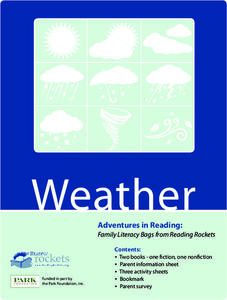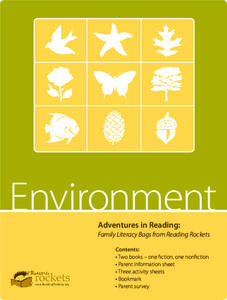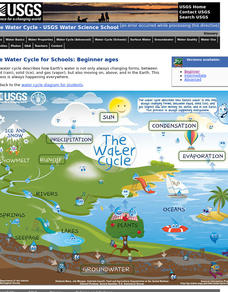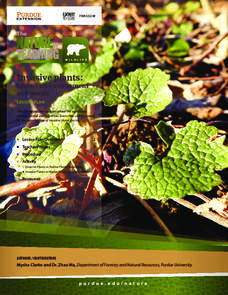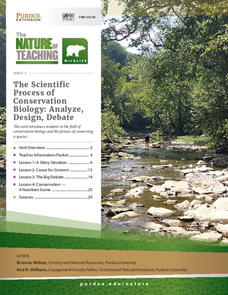Curated OER
Quarter Conservation
Here is another in the interesting series of lessons that use the special State Quarters as a learning tool. This one uses the California State Quarter. During this lesson, pupils learn the many ways they can conserve natural resources...
Environmental Protection Agency (EPA)
Excuse Me, Is This the Way to the Drainpipe?
Elementary kids read and color the story of Willy Wetsworth, a drop of water, as he describes the journey that he and his friends take to provide fresh water to houses. He tells his story to Martha Merriweather, a little girl, and...
PBS
Reading Adventure Pack: Weather
A reading adventure pack, featuring a fiction and nonfiction book focuses on the weather. Scholars read Cloudy with a Chance of Meatballs by Judi Barrett and Seymour Simon and then complete three creative activities. Participants craft...
British Council
A Green Classroom
Go green! Scholars compare pictures of two classrooms. They discuss how one classroom is more environmentally conservative than the other, and then make a list of ways they can make their own classrooms greener.
Bonneville
Probes of Prior Knowledge
A bright future learning about electricity awaits. Future scientists conduct two probes to investigate electrical energy. The first requires them to think about how electricity is made, while the second has them identify appliances that...
PBS
Reading Adventure Pack: Environment
A fiction and nonfiction text, The Great Kapok Tree: A Tale of the Amazon Rain Forest by Lynne Cherry and I See a Kookaburra! Discovering Animal Habitats Around the World by Steve Jenkins and Robin Page begins a learning experience in...
DiscoverE
Everyday Engineering: Water Pollution Clean Up
Water, water, everywhere, but pollution is a major problem. Scholars design a filtration device or process that removes dirt and other particles from water. They use various household objects such as marbles, cotton balls, or coffee...
Museum of Science
Garden in a Glove
Calling all green thumbs! Using a clear plastic glove, pupils create a plant nursery. Learners plant different types of seeds in a moistened cotton ball that is placed into each of the fingers in the glove. Leaving the seeds there for...
Museum of Science
Recycled Paper
Watch paper form anew. Scholars take part in an activity where they create new decorative paper from used white and colored office paper. They use a blender to make a pulp slurry, then place it into molds to form the paper. They learn...
Museum of Science
Worm Farm
It is not a barrel of monkeys—it's a jar of worms! Scholars create a worm farm in a spaghetti sauce jar. Pupils layer moist soil, sand, and oatmeal to create a habitat for worms. Individuals place worms into the habitat, cover it with...
Museum of Science
Wind Turbine
Let the energy blow. Using mostly easily found material such as PVC pipe and fans, pupils build wind turbines. Scholars connect a multimeter to an electric motor to determine the amount of energy generated by their designs. Learners then...
US Geological Survey
The Water Cycle for Schools: Beginner Ages
Explore a day in the life of a water droplet. An interactive infographic helps scholars learn how water cycles work from precipitation all the way around to condensation. Learners hover over each step of the cycle to read more as they...
National Wildlife Federation
Watershed Web: A Field Trip
Observing plant succession doesn't have to be a decade long process. A hands-on lesson has groups study succession over a designated space. Learners use their observation skills to record differences in plant and soil characteristics in...
Purdue University
Eco-llapse
A balanced ecosystem doesn't mean balanced populations. Budding scientists complete a series of activities to learn about the relationship between producers and consumers in an ecosystem. They complete the wildlife conservation...
Purdue University
Mammals and Ecosystems
Mammals have unique interactions with their ecosystems. Using a multi-part lesson, learners research local mammals using recommended websites and use their findings to create their own paper ecosystems including appropriate mammals. They...
Purdue University
Ashes to Ashes: We All Grow Up
Ecosystems are constantly changing whether people notice or not. An inquiry-based lesson examines types of ecosystem changes and how they relate to wildlife conservation. Learners classify changes as succession and disturbance using a...
Purdue University
Reptiles, Amphibians, and the Scientific Method
What do a reptile and an amphibian have in common? A three-part lesson allows scholars to investigate the similarities and differences between the two types of animals by identifying specific body parts. The lesson highlights the...
Purdue University
What a Waste of Food!
Follow the life of an apple from harvest to the consumer. A three-part lesson describes the different steps to get an apple from the farmer to your kitchen and the approximate waste that happens at each step. They discuss the process and...
Purdue University
Food Waste Solutions
Easy doesn't always mean better. In an era with pre-packaged everything, learners consider the environmental impact of the convenient trend. They critique the packaging of food and how waste impacts cost and then look for solutions.
Purdue University
Food Waste and the Environment
Out of sight out of mind can be a dangerous habit. Learners investigate the life of food waste after it leaves people's homes and its impact on the environment. They complete a series of three activities that involve building a mini...
Purdue University
Trees of the Midwest
All trees are not created equal. A set of three wildlife conservation lessons has learners examine the characteristics of individual trees. They look at the life cycle of the tree using a story and reference a field guide to identify...
Purdue University
Take-a-Hike
Learn about nature and health all in one set of lessons. Individuals use a scavenger hunt to record observations during a nature hike. They then complete activities to categorize their observations and rate the health of the habitat for...
Purdue University
Invasive Plants: Impact on Environment and People
It's the attack of the invasive species! Young scientists simulate the behavior of an invasive species with a game-like activity. They assume the roles of native plants, invasive plants, and resources and watch the invasive plant takes...
Purdue University
The Scientific Process of Conservation Biology: Analyze, Design, Debate
Scientists use data to learn about species survival—and your classes can too! A set of four lessons guides learners through a process to draw conclusions about the fluctuations in the population of the Hellbender species. They read...




